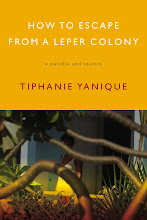How to Escape from a Leper Colony is set in Africa, America and all over the Caribbean. The characters are all races and ages. That seems very Caribbean to me! I think this idea of racial mash, cultural upheaval and willed or unwilling escape is vital to all the stories. All the characters find themselves to be strangers in a land they thought was their own. I’m very interested in political realities, and many of these stories likely have a political air about them. I’m also very interested in romantic love, which I explore in the stories. I think falling in love is a hugely brave, totally stupid, and absolutely necessary thing for the humanity in the human being. I think falling in love can be a historical and political action.
I am interested in stories that invoke the magical, mysterious, and the religious. I see real life, the lives you and I are living, as a metaphoric and allegorical journey. I want my stories to highlight this aspect of humanity in particular. So a young man carries a cross on his back to martyr himself in defiance of racism and to his willingness for love. A young runner can develop a disease that keeps him from being able to move but allows to him understand himself and his family. An island man moving to Texas can be haunted by a chapel in the middle of a busy city. A coffin shop can take on the beauty and intensity of an art gallery. I believe the fantastic is present in very ordinary moments.
The Virgin Islands isn't generally perceived as a place that creates literature and intellectualism, and so many Virgin Islands writers choose to self-publish instead of seeking support from a publisher. In the tourist shops and on the cruise ships they carry Herman Wouk’s Don’t Stop the Carnival, which is set on a spoof version of St. Thomas. But it's not that easy to find fiction by actual Virgin Islanders. I wrote this book very aware of Caribbean people. I wanted a teenager, like the one I was, to find these stories. I wrote the book for thuggy guys, pageant girls, church women, wives, men who leave and miss their homes. Each character seemed like a version of the audience I hoped would be moved by the story.
Appearances
September 15
The University of Puget Sound
Tacoma, Washington
October 7
Pen Faulkner Gala, Washington, DC
The University of Puget Sound
Tacoma, Washington
October 7
Pen Faulkner Gala, Washington, DC
How to Escape from a Leper Colony
Tiphanie Yanique on Magic Realism, Love and Loss, and the Desire for Place
Subscribe to:
Comments (Atom)

